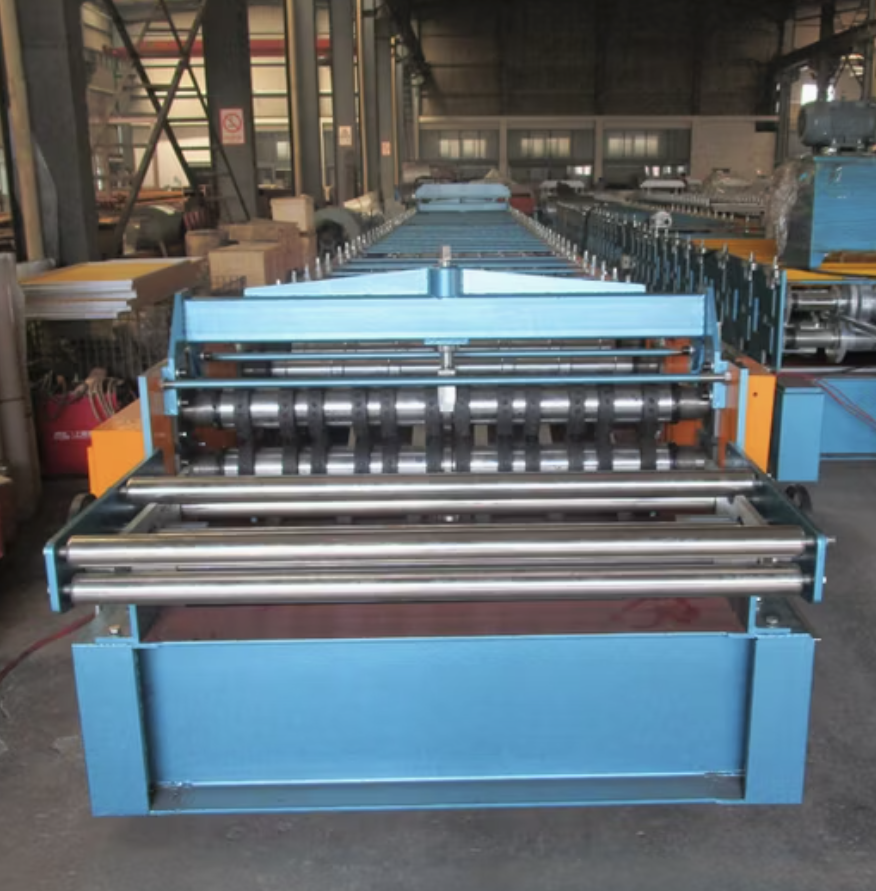To express an interest in this machine please submit the form below.

Not Sure What Machine You Need?
Select Your Profile, We'll Match It
Choose your desired profile drawing, and let Machine Matcher connect you with the best roll forming machine tailored to your needs.
Browse Profiles


A Deck Roll Forming Machine transforms metal coils into precisely shaped deck profiles through a continuous bending process. The machine is engineered for efficiency, precision, and durability, catering to high-volume production demands. It is widely used in industries such as construction, industrial warehousing, and commercial buildings.
Key Features:
| Specification | Details |
|---|---|
| Roller Material | High-grade steel (e.g., GCr15) with hard chrome coating for enhanced durability and precision. |
| Frame Structure | Heavy-duty welded steel frame, resistant to vibrations and deformation. |
| Punching and Notching | Hydraulic or servo-driven systems for precise holes and cutouts, customizable to requirements. |
| Servo Motors | High-efficiency motors ensuring consistent speed and accurate operation. |
| Hydraulic Cutting System | Hydraulic-powered guillotine cutters for clean, burr-free edges. |
| PLC Control System | Integrated with brands like Siemens or Mitsubishi for user-friendly operation and programming. |
| Machine Speed | Typically 20-30m/min (customizable up to 40m/min). |
| Safety Features | Enclosures, emergency stop buttons, and protective guards for operator safety. |
| Material Thickness | 0.7mm to 1.5mm (customizable based on client requirements). |
| Panel Width | Customizable according to the desired deck profile (common range: 600mm to 1200mm). |
| Power Requirements | 380V/50Hz (customizable for other power standards). |
Q1: What industries commonly use Deck Roll Forming Machines?
A: Deck Roll Forming Machines are primarily used in the construction industry for producing roofing and flooring panels. They are also used in industrial and commercial building projects to create lightweight and durable support systems for concrete slabs.
Q2: What materials can this machine process?
A: Deck Roll Forming Machines typically work with galvanized steel, stainless steel, or aluminum. The material type and thickness depend on the specific project requirements.
Q3: Can the machine be customized for unique profiles?
A: Yes, the machine can be customized to produce specific deck profiles, dimensions, and thicknesses based on client needs.
Q4: How does the hydraulic cutting system improve performance?
A: The hydraulic cutting system provides precise, clean cuts without burrs, ensuring that the final product meets quality standards and requires no additional finishing.
Q5: What is the typical maintenance required for these machines?
A: Maintenance includes regular lubrication of moving parts, inspection of rollers for wear, checking hydraulic systems for leaks, and ensuring the PLC system is updated and functioning correctly.
Q6: How long does installation take?
A: Installation typically takes 1-2 weeks, depending on the machine size and site readiness. A professional team is usually required for setup and calibration.
Q7: Is training provided for machine operation?
A: Most manufacturers offer training sessions to operators to ensure efficient use of the machine and to familiarize them with safety protocols and maintenance routines.
Q8: What safety features are included?
A: The machine includes protective enclosures, emergency stop buttons, and safety guards to prevent accidents and ensure a secure working environment.
Q9: What is the price range for a Deck Roll Forming Machine?
A: Prices can range from $50,000 to $150,000, depending on the level of automation, customization, and additional features.
Q10: Are there optional extras available for the machine?
A: Yes, optional extras include:
Copyright 2026 © Machine Matcher.